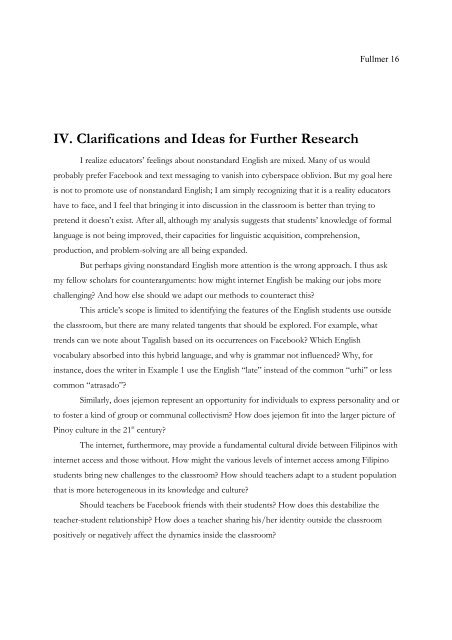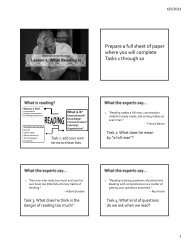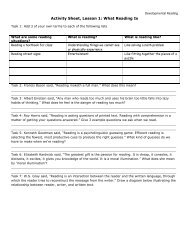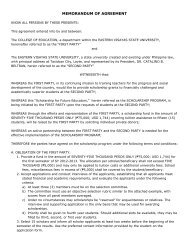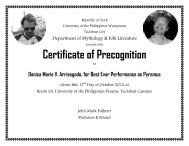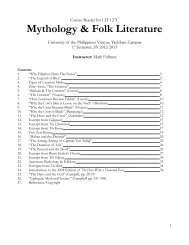Literacy in the Facebook Era - Waray Dictionary and Language ...
Literacy in the Facebook Era - Waray Dictionary and Language ...
Literacy in the Facebook Era - Waray Dictionary and Language ...
Create successful ePaper yourself
Turn your PDF publications into a flip-book with our unique Google optimized e-Paper software.
Fullmer 16<br />
IV. Clarifications <strong>and</strong> Ideas for Fur<strong>the</strong>r Research<br />
I realize educators’ feel<strong>in</strong>gs about nonst<strong>and</strong>ard English are mixed. Many of us would<br />
probably prefer <strong>Facebook</strong> <strong>and</strong> text messag<strong>in</strong>g to vanish <strong>in</strong>to cyberspace oblivion. But my goal here<br />
is not to promote use of nonst<strong>and</strong>ard English; I am simply recogniz<strong>in</strong>g that it is a reality educators<br />
have to face, <strong>and</strong> I feel that br<strong>in</strong>g<strong>in</strong>g it <strong>in</strong>to discussion <strong>in</strong> <strong>the</strong> classroom is better than try<strong>in</strong>g to<br />
pretend it doesn’t exist. After all, although my analysis suggests that students’ knowledge of formal<br />
language is not be<strong>in</strong>g improved, <strong>the</strong>ir capacities for l<strong>in</strong>guistic acquisition, comprehension,<br />
production, <strong>and</strong> problem-solv<strong>in</strong>g are all be<strong>in</strong>g exp<strong>and</strong>ed.<br />
But perhaps giv<strong>in</strong>g nonst<strong>and</strong>ard English more attention is <strong>the</strong> wrong approach. I thus ask<br />
my fellow scholars for counterarguments: how might <strong>in</strong>ternet English be mak<strong>in</strong>g our jobs more<br />
challeng<strong>in</strong>g? And how else should we adapt our methods to counteract this?<br />
This article’s scope is limited to identify<strong>in</strong>g <strong>the</strong> features of <strong>the</strong> English students use outside<br />
<strong>the</strong> classroom, but <strong>the</strong>re are many related tangents that should be explored. For example, what<br />
trends can we note about Tagalish based on its occurrences on <strong>Facebook</strong>? Which English<br />
vocabulary absorbed <strong>in</strong>to this hybrid language, <strong>and</strong> why is grammar not <strong>in</strong>fluenced? Why, for<br />
<strong>in</strong>stance, does <strong>the</strong> writer <strong>in</strong> Example 1 use <strong>the</strong> English “late” <strong>in</strong>stead of <strong>the</strong> common “urhi” or less<br />
common “atrasado”?<br />
Similarly, does jejemon represent an opportunity for <strong>in</strong>dividuals to express personality <strong>and</strong> or<br />
to foster a k<strong>in</strong>d of group or communal collectivism? How does jejemon fit <strong>in</strong>to <strong>the</strong> larger picture of<br />
P<strong>in</strong>oy culture <strong>in</strong> <strong>the</strong> 21 st century?<br />
The <strong>in</strong>ternet, fur<strong>the</strong>rmore, may provide a fundamental cultural divide between Filip<strong>in</strong>os with<br />
<strong>in</strong>ternet access <strong>and</strong> those without. How might <strong>the</strong> various levels of <strong>in</strong>ternet access among Filip<strong>in</strong>o<br />
students br<strong>in</strong>g new challenges to <strong>the</strong> classroom? How should teachers adapt to a student population<br />
that is more heterogeneous <strong>in</strong> its knowledge <strong>and</strong> culture?<br />
Should teachers be <strong>Facebook</strong> friends with <strong>the</strong>ir students? How does this destabilize <strong>the</strong><br />
teacher-student relationship? How does a teacher shar<strong>in</strong>g his/her identity outside <strong>the</strong> classroom<br />
positively or negatively affect <strong>the</strong> dynamics <strong>in</strong>side <strong>the</strong> classroom?


